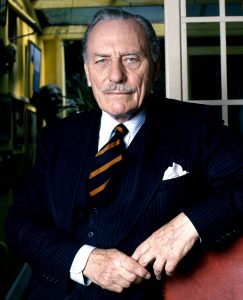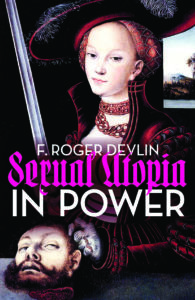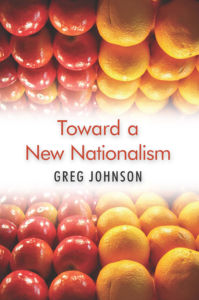Enoch Powell’s Rivers of Blood
Posted By Morris van de Camp On In North American New Right | Comments Disabled2,155 words
Full text of Enoch Powell’s Rivers of Blood Speech here [1]. One can hear it read here [2].
The single most talked-about Member of the British Parliament today was a lowly backbencher who was kicked out of the shadow government of his party. The cause of this strange situation is the farsightedness of the man combined with his extraordinary eloquence. The backbencher’s name: Enoch Powell. The reason for his fame is a single speech delivered on April 20, 1968, to an audience in Birmingham. It has come to be known as The Rivers of Blood Speech.
Powell argued that immigration from the Commonwealth — especially the non-white parts — was producing a race problem in England that mirrored the intractable race problem in the United States.
Powell was correct, of course. England now has Negro street crime, race riots (a particularly nasty series occurred in 2011 [1] [3]), Islamic terrorism, ISIS fighters, knife attacks, concert bombings, car-rammings, and Rotherham grooming gangs. There are also associated problems, like the loss of Anglo-Saxon liberties like free speech to accommodate the newcomers as well as schoolmarmish race-committees that keep down whites.
How did Powell predict this situation? What made Powell such a formidable force was that people know more about him than Prime Minister Edward Heath, the man who drove Powell from the Conservative Party. Powell was not an aristocrat. His family was something like the “upper-working-class,” and they came from a deindustrializing area. This article will seek to find out what elements Powell had that made him so right, so courageous, and so memorable.
Hard Work
 [4]
[4]You Can buy F. Roger Devlin’s Sexual Utopia in Power here [5]
Powell didn’t come from a large family. He was an only child. Powell’s upbringing as an only child was fortuitous in that the resources of several generations were devoted to him. When Powell himself became a family man, he had more than one child. His father was the headmaster of a school in Birmingham. His mother devoted herself to teaching her son as much as he could learn. And the young Powell learned it. He studied hard as a boy.
By the time he reached his twenties, Powell knew German, Latin, and Greek, and became well versed in the classics; enough so that he would be invited to be a professor on the subject in Australia as a very young man. Powell later went on to learn Urdu.
Powell knew so much about ancient Greece that when he traveled to Australia in the 1930s he gave lectures to his passengers during their Athens stopover. He wasn’t a know-it-all. He carried enough of a gravitas that his fellow travelers enjoyed his talks.
When World War II came, he returned to England and enlisted as a private. The tragedy of that conflict and the missteps in British policy that caused the disaster is beyond the scope of this article, but Powell’s military career is illustrative of good leadership, as well as a military that is ethnically aligned to its nation-state.
Because the British military was then free of the promotion time-in-grade straightjacket that is applied in America’s armed forces to keep down racial jealousy, Powell was quickly promoted. He remarked later that the jump from Private to Lance Corporal was the biggest jump in leadership he experienced. As a Lance Corporal, Powell had command authority, and his first unpleasant duty was to bring a soldier up on charges for drunkenly urinating in an inappropriate place. Shortly thereafter he became an officer.
He was assigned to Military Intelligence and sent to North Africa. Each day he rose before dawn to read German radio messages and sort through reconnaissance photographs. After the British and Americans won in North Africa, Powell was posted to India. He finished his career as a Brigadier. It is a remarkable accomplishment to rise from Private to Staff Sergeant in such a short time. To rise to the rank of Brigadier from Private that quickly is so unusual that Powell might be the only man who’s ever done it. It was Powell’s hard work that got him there. Not just his hard work as a soldier, but his academic drive that made him well-read, educated, and fluent in several languages before enlisting. In other words, Powell had what it took to be a Brigadier before he enlisted as a Private.
Mastering the Basics
 [6]
[6]You can buy Greg Johnson’s The White Nationalist Manifesto here [7]
After the war, Powell returned to England and went into politics. He joined the Conservative Party and won his political spurs by running in a Labour Party stronghold in 1947. These forlorn endeavors are common for up-and-coming British politicians and they help the candidate learn how to get elected with few risks for the party in general. In 1950 he was elected in his own right. He represented Wolverhampton, a town near Birmingham. Much of Powell’s early focus was kitchen table issues. Powell’s economic policy was like that of Ronald Reagan and Margret Thatcher in the 1980s before these ideas became fashionable. In 1950, Powell was out-of-step with the rest of British opinion, so he really had to have a solid understanding of his economic ideas. A single bad debate could have sunk him.
One can watch Powell give speeches and debate others on the internet. What one immediately notices is Powell’s eloquence, as well as his excellent wardrobe. It is impossible to imagine the man in a tracksuit and camouflaged baseball hat with the words “Duck Hunting” embroidered on the crown. In my own life and career, I’ve found that dressing well pays considerable dividends in everyday interactions. I encourage the reader to see the difference when dealing with customer service when wearing a jacket and tie rather than jeans and a t-shirt.
Interpreting the Data Right; in Time and Place
Powell’s Rivers of Blood Speech is a masterwork of properly interpreting data at the right time and the right place. Indeed, Powell had been properly interpreting data for many years. He was probably the first politician to provide a vision for the British to make their way in the world following the collapse of the British Empire. In a 1961 speech to The Royal Society of Saint George, he said:
That power and that glory [of the British Empire] have vanished, as surely, if not as tracelessly, as the imperial fleet from the waters of Spithead. And yet England is not as Nineveh and Tyre, nor as Rome, nor as Spain. Herodotus relates how the Athenians, returning to their city after it had been sacked and burnt by Xerxes and the Persian army, were astonished to find, alive and flourishing in the blackened ruins, the sacred olive tree, the native symbol of their country. So we today, at the heart of a vanished empire, amid the fragments of demolished glory, seem to find, like one of her own oak trees, standing and growing, the sap still rising from her ancient roots to meet the spring, England herself. [2] [8]
Powell demonstrates a critical truth: Imperial ventures in far-off lands aren’t the end sum of national greatness. At the height of their power, British soldiers patrolled the Hindu Kush. As this article goes to print, British soldiers patrol the Hindu Kush again, and yet this fact makes nobody happier than before. By the same token, do Americans feel happy that the US Infantry is also in the Hindu Kush and patrolling the DMZ in Korea?
What is also so outstanding about the above passage is that it can inspire one to do anything, even in the demoralizing context of the recently-vanished British Empire. Personally, I can see something of a bold call to return to the industrialized past of England’s Black Country, where science, industry, and innovation came together.

A call for post-Imperial greatness: The flag of The Black Country, the region developed by Powell’s ancestors and represented by Powell in Parliament. This flag is notable in that it shows the nobility of industrialization and hard work. An Industrialized society gives rise to many other innovations. Additionally, industry allows ordinary men to economically prosper and better support their family and community.
Powell also recognized the demographic changes occurring in England and rightly interpreted how these changes would play out. Indeed, the changes were happening in Powell’s own home district:

Caribbean blacks in Powell’s West Midlands home.

One could probably match up grooming gang locations with this figure — Pakistani locations.

Displaced! British Whites in the West Midlands.
In his Rivers of Blood Speech, Powell tells of a constituent’s problems caused by changing demographics:
She is becoming afraid to go out. Windows are broken. She finds excreta pushed through her letterbox. When she goes to the shops, she is followed by children, charming, wide-grinning piccaninnies. They cannot speak English, but one word they know. “Racialist”, they chant.
Powell’s description of the policy is an understatement of the serious scale of the problems Third World people create. Today, there aren’t just broken windows, but gang rapes and bombings done to the chant of “Racialist.”
Powell & His Data, Misunderstood
 [9]
[9]You can buy Greg Johnson’s Toward a New Nationalism here [10]
Powell’s remarks were greeted politely by the small audience that heard it, but the public went ballistic when the speech was transmitted across Britain. Most of the public liked his speech, especially the working class. Those that hated the speech really hated it.
Had the speech been given in a critical moment, when Powell had a chance to become Party Leader or Prime Minister, he would have won those offices. However, it didn’t matter. The political elite in Britain chose to not take a stand on the immigration issue. Powell eventually left the Conservative Party for a Unionist one in Northern Ireland and continued to serve in Parliament. In his new role, Powell’s influence was reduced and he had no chance to become Prime Minister.
I can only speculate as to why the British Political elite went against Powell, however, my guess is an educated one. First, the British and Americans have a common political culture. When the Americans went for “civil rights,” the British naturally followed. Second, among whites, the key implementers of “civil rights” were valorous men who’d been the field-grade officers of World War II. Prime Minister Heath was a Major in the Royal Artillery during the conflict. Additionally, “civil rights” is semi-religious — like UFO sightings and crop circle stuff — where its believers double down on their beliefs in the face of evidence to the contrary. However, Powell didn’t cause racial trouble with his speech, he merely pointed to ongoing racial trouble and wished to not see it further imported into the United Kingdom. The Rivers of Blood Speech was made after it was conclusively shown that the 1964 Civil Rights Act in the United States made racial problems worse. Indeed, Powell’s speech was given as American cities were still smoldering due to the King assassination riots.
Powell, Triumphant?
There are interviews of non-whites one can see on English documentaries about Powell’s Rivers of Blood Speech. These non-whites often say they started to feel unwelcome after the speech. Strangely, none of these people ever flee English “racists” for Jamaica or Pakistan, but there is certainly truth to what they are saying. Concepts expressed by establishment figures, even backbenchers like Powell, tend to grip the public’s mind while nobodies merely shout great truths into the wind.
A case in point — Pakistani grooming gangs were well known to the people of Northern England, but resistance to it never materialized until a reporter for London’s prestigious paper The Times named Andrew Norfolk started to write articles about the situation. In a talk in 2015, Mr. Norfolk said,
On my own, I could have done exactly the same work as I’ve done [in his reports spanning five years] and it would have achieved precisely nothing. I could have posted blogs, I could have stood and shouted on street corners. It wouldn’t have changed anything. But this wasn’t me alone. This was The Times. . . because it was The Times that kept running those stories, people listened. [3] [11]
In light of the grooming gangs, the British establishment is slowly starting to come around to Powell’s way of thinking, although as yet they are only focused on the worst sort of non-white offenders. The British have also left the European Union — a move Powell would have supported. It remains to be seen if the British start to remove the rest of their troublesome non-white population. Should they do so, we in America can feel a sense of hope since we share a common political culture.
In sum, Powell was a prophet of the highest order. He didn’t preach on behalf of a new religion or do cheap parlor tricks with a crystal ball. Instead, he spoke the truth — a very uncomfortable truth — as he saw it, regardless of the consequences. We would all do well to listen to his words and emulate his personal virtues.
Notes
[1] [12] Sam Francis wrote about another nasty race riot in 2001 here: https://vdare.com/articles/british-race-riots-were-predictable-and-predicted [13]
[2] [14] From a transcript of Powell’s speech to the Society, as maintained by the Churchill Foundation. https://archive.li/gWolW [15]
[3] [16] From Norfolk’s talk on his investigation to Shift North 2015. https://www.youtube.com/watch?v=qrUiHB5qJJ0&spfreload=10 [17]